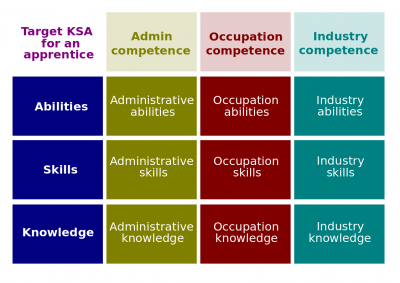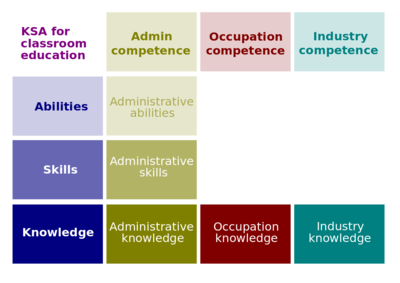Difference between revisions of "Book of KSA Projects"
(→Educational Methods) |
(→Learning Environments) |
||
| Line 44: | Line 44: | ||
[[Category:CNM Cyber Curriculum]][[Category:Lecture notes]] | [[Category:CNM Cyber Curriculum]][[Category:Lecture notes]] | ||
| − | |||
| − | |||
| − | |||
| − | |||
| − | |||
| − | |||
| − | |||
| − | |||
| − | |||
| − | |||
| − | |||
| − | |||
| − | |||
| − | |||
| − | |||
| − | |||
| − | |||
| − | |||
| − | |||
| − | |||
| − | |||
| − | |||
| − | |||
| − | |||
| − | |||
| − | |||
| − | |||
| − | |||
| − | |||
| − | |||
| − | |||
===Educational Credentials=== | ===Educational Credentials=== | ||
Revision as of 02:01, 30 April 2020
The Introduction to Education (hereinafter, the Session) is the learning session that has been created to introduce its participants to education and related topics. The Session consists of five lessons, each of which is made of three to six lectios. At CNM Cyber, a lectio is a lesson part. Every lectio includes a presentation and a one question, either a quiz or survey.
The official version of the Session is published at CNM Cert. The Session materials are also published at CNM Tube, CNM Wiki, and various channels for marketing and convenience purposes.
The Session belongs to the Career-Overview Sessions of the CNM Cyber Orientation.
Contents
Summaries
Predecessor
- The predecessor session is Introduction to Careers.
Outline
Introduction to Careers # Lessons Lectios 1 Education Essentials 2 Educational Methods 3 Learning Environments 4 Educational Credentials 5 Educational Service Providers
Successor
- The successor session is Introduction to CNM Cyber.
See also
Educational Credentials
- Main wikipage: Educational Credentials; video (8:38)
- Educational credential. A credential that confirms one's education. Some educational institutions offer educational programs especially in creative arts and the medical field that combine credentialing of academic achievements and professional experience.
- Registered apprenticeship. In the United States, apprenticeship that is registered and overseen by a government organization. In some states, this organization is the United States Department of Labor; similar state bodies register and oversee registered apprenticeships in the other states. Those organizations issue educational credentials to the graduates from the registered apprenticeships.
- Academic credential. An educational credential that is issued by an educational institution or credentialing organization to certify specific academic achievements traditionally related to someone's knowledge.
- High school diploma. An academic credential that certifies that someone has been graduated from a high school.
- GED (General Equivalency Diploma). A credential that certifies that someone has successfully passed the test that covers United States or Canadian high school-level academic skills.
- Diploma. A certificate or deed issued by an educational institution, such as college or university, that testifies that the recipient has completed a particular course of study.
- Associate degree (or associate's degree). An undergraduate academic degree awarded by colleges and universities upon completion of a course of study intended to usually last two years or more.
- Bachelor's degree. An undergraduate academic degree awarded by colleges and universities upon completion of a course of study lasting three to seven years depending on institution and academic discipline.
- Master's degree. A graduate academic degree awarded by colleges and universities upon completion of a course of study lasting one to three years beyond the coursework required by a Bachelor's degree.
- PhD (Doctor of Philosophy, also known as PhD degree or Ph.D.). The highest, terminal academic degree awarded by universities in most countries. The requirements to earn a PhD regularly include comprehensive examinations and work on thesis or dissertation based on extensive research.
- Professional degree. A degree that prepares someone to work in a particular profession, often meeting the academic requirements for licensure or accreditation.
- Credentialism (academic inflation). The process of the devaluation of educational qualifications because of the needs of educational institutions to increase revenues and cut expenses, on one side, and increasing demands, on the other side. This process further provokes credential creep.
Educational Service Providers
- Main wikipage: Educational Service Providers; video (5:29)
- Educational institution. An enterprise, usually an organization or its constituent part, that exists to provide the public with education.
- Preschool (nursery school, kindergarten). An educational institution that offers early childhood education to children before they begin compulsory education at primary school.
- Elementary school (primary school). An educational institution that offers initial or primary compulsory education, in the United States and Canada, from the age of about seven to twelve. Students usually attend elementary school after preschool and before secondary school.
- Secondary school (in the United States, a combination of middle school and high school). An educational institution that offers compulsory education beyond its primary level that is offered at elementary school. In the United States and Canada, the students of secondary schools are from the age of about twelve to eighteen.
- Tertiary school (college, university, post-secondary school). An educational institution that facilitates learning beyond compulsory education and awards academic credentials higher than high school diplomas.
- Vocational school (trade school, career center, or vocational college). An educational institution that facilitates learning beyond compulsory education, but does not award academic credentials higher than high school diplomas. Instead, vocational schools concentrate on those occupations that do not require advanced academic credentials and those KSAs that are needed to start working in those occupations.
- Educational service provider. An enterprise, usually an organization or its constituent part, that provides anyone or anyones with education regardless of what this enterprise generally does. The providers include both educational institution and enterprises that are not in any educational business.
- Workforce developer. Any entity in the business of workforce development.
- Workforce development. The process of developing workforce.
- Apprentice-hosting employer. The employer that hosts one or more apprentices.
The successor session is Welcome to CNM.
Preview presentations
Video
- The video preview presentation, 1:37 minutes, is published at https://youtu.be/LrUmDbuDfFc. Here is its full text:
In this session we will talk about educational essentials, what is education, formal training, compulsory education. We will start by education objectives, we will take a look at Bloom`s taxonomy of education objectives, we will discuss different domains of them, the effectiveness of them.
We will touch educational methods including narrated instruction, practical instruction, cognitive research and experiential learning. Then we will go to learning environments. We will touch educational formats, leaning tools including, learning management systems and document collaboration system which are widely used right now.
Then we will go to learning arrangements such as internships, apprenticeships, elicitation techniques, anything which can be created with elicitation techniques. We will touch education credentials including academic credentials and we will end with academic service providers.
Hopefully we will be ready to go to carrier price services.


